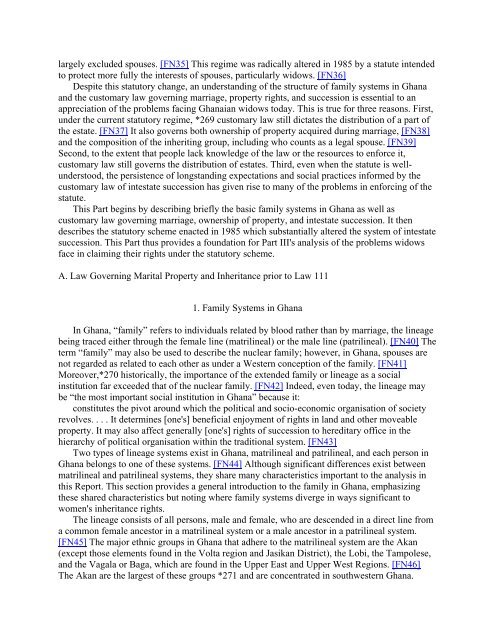Law, Culture and Women's Inheritance Rights in ... - Leitner Center
Law, Culture and Women's Inheritance Rights in ... - Leitner Center
Law, Culture and Women's Inheritance Rights in ... - Leitner Center
Create successful ePaper yourself
Turn your PDF publications into a flip-book with our unique Google optimized e-Paper software.
largely excluded spouses. [FN35] This regime was radically altered <strong>in</strong> 1985 by a statute <strong>in</strong>tended<br />
to protect more fully the <strong>in</strong>terests of spouses, particularly widows. [FN36]<br />
Despite this statutory change, an underst<strong>and</strong><strong>in</strong>g of the structure of family systems <strong>in</strong> Ghana<br />
<strong>and</strong> the customary law govern<strong>in</strong>g marriage, property rights, <strong>and</strong> succession is essential to an<br />
appreciation of the problems fac<strong>in</strong>g Ghanaian widows today. This is true for three reasons. First,<br />
under the current statutory regime, *269 customary law still dictates the distribution of a part of<br />
the estate. [FN37] It also governs both ownership of property acquired dur<strong>in</strong>g marriage, [FN38]<br />
<strong>and</strong> the composition of the <strong>in</strong>herit<strong>in</strong>g group, <strong>in</strong>clud<strong>in</strong>g who counts as a legal spouse. [FN39]<br />
Second, to the extent that people lack knowledge of the law or the resources to enforce it,<br />
customary law still governs the distribution of estates. Third, even when the statute is wellunderstood,<br />
the persistence of longst<strong>and</strong><strong>in</strong>g expectations <strong>and</strong> social practices <strong>in</strong>formed by the<br />
customary law of <strong>in</strong>testate succession has given rise to many of the problems <strong>in</strong> enforc<strong>in</strong>g of the<br />
statute.<br />
This Part beg<strong>in</strong>s by describ<strong>in</strong>g briefly the basic family systems <strong>in</strong> Ghana as well as<br />
customary law govern<strong>in</strong>g marriage, ownership of property, <strong>and</strong> <strong>in</strong>testate succession. It then<br />
describes the statutory scheme enacted <strong>in</strong> 1985 which substantially altered the system of <strong>in</strong>testate<br />
succession. This Part thus provides a foundation for Part III's analysis of the problems widows<br />
face <strong>in</strong> claim<strong>in</strong>g their rights under the statutory scheme.<br />
A. <strong>Law</strong> Govern<strong>in</strong>g Marital Property <strong>and</strong> <strong>Inheritance</strong> prior to <strong>Law</strong> 111<br />
1. Family Systems <strong>in</strong> Ghana<br />
In Ghana, “family” refers to <strong>in</strong>dividuals related by blood rather than by marriage, the l<strong>in</strong>eage<br />
be<strong>in</strong>g traced either through the female l<strong>in</strong>e (matril<strong>in</strong>eal) or the male l<strong>in</strong>e (patril<strong>in</strong>eal). [FN40] The<br />
term “family” may also be used to describe the nuclear family; however, <strong>in</strong> Ghana, spouses are<br />
not regarded as related to each other as under a Western conception of the family. [FN41]<br />
Moreover,*270 historically, the importance of the extended family or l<strong>in</strong>eage as a social<br />
<strong>in</strong>stitution far exceeded that of the nuclear family. [FN42] Indeed, even today, the l<strong>in</strong>eage may<br />
be “the most important social <strong>in</strong>stitution <strong>in</strong> Ghana” because it:<br />
constitutes the pivot around which the political <strong>and</strong> socio-economic organisation of society<br />
revolves. . . . It determ<strong>in</strong>es [one's] beneficial enjoyment of rights <strong>in</strong> l<strong>and</strong> <strong>and</strong> other moveable<br />
property. It may also affect generally [one's] rights of succession to hereditary office <strong>in</strong> the<br />
hierarchy of political organisation with<strong>in</strong> the traditional system. [FN43]<br />
Two types of l<strong>in</strong>eage systems exist <strong>in</strong> Ghana, matril<strong>in</strong>eal <strong>and</strong> patril<strong>in</strong>eal, <strong>and</strong> each person <strong>in</strong><br />
Ghana belongs to one of these systems. [FN44] Although significant differences exist between<br />
matril<strong>in</strong>eal <strong>and</strong> patril<strong>in</strong>eal systems, they share many characteristics important to the analysis <strong>in</strong><br />
this Report. This section provides a general <strong>in</strong>troduction to the family <strong>in</strong> Ghana, emphasiz<strong>in</strong>g<br />
these shared characteristics but not<strong>in</strong>g where family systems diverge <strong>in</strong> ways significant to<br />
women's <strong>in</strong>heritance rights.<br />
The l<strong>in</strong>eage consists of all persons, male <strong>and</strong> female, who are descended <strong>in</strong> a direct l<strong>in</strong>e from<br />
a common female ancestor <strong>in</strong> a matril<strong>in</strong>eal system or a male ancestor <strong>in</strong> a patril<strong>in</strong>eal system.<br />
[FN45] The major ethnic groups <strong>in</strong> Ghana that adhere to the matril<strong>in</strong>eal system are the Akan<br />
(except those elements found <strong>in</strong> the Volta region <strong>and</strong> Jasikan District), the Lobi, the Tampolese,<br />
<strong>and</strong> the Vagala or Baga, which are found <strong>in</strong> the Upper East <strong>and</strong> Upper West Regions. [FN46]<br />
The Akan are the largest of these groups *271 <strong>and</strong> are concentrated <strong>in</strong> southwestern Ghana.


